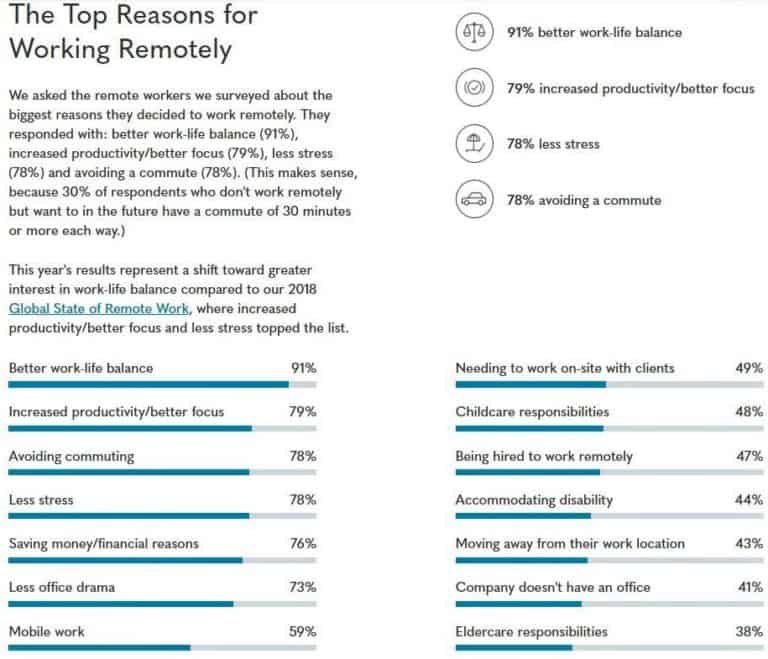With the number of people working from home or remotely rising, many are asking: Is remote working the way of the future?
According to LinkedIn’s Global Talent Trends 2019 report, the number of job posts on LinkedIn mentioning flexible work such as remote working has increased by 78%. Workers are also seeking remote work opportunities in growing numbers. There has been a 24% increase in job seekers nominating working flexibly as an important factor in their job search.
Companies like Automattic are leading the way with office free, 100% remote working conditions for all of its 930 staff. Staff are reinbursed the cost of setting up their home offices, using co-working spaces or buying a coffee when working out. While they make full use of remote working tech like videoconferencing, messaging and team collaboration tools, the company also covers expenses for staff to travel to team meetups throughout the year.
Millennials are increasingly demanding flexibility and freedom in their careers more than any other generation with 82% of millennials stating they felt a greater sense of loyalty towards an employer that allows remote working or working from home (WFH). The State of Remote Work 2019 survey of remote workers aged 22-65, found that remote workers reported feeling 84% happier and 76% more loyal to their employer than office based workers.
Benefits of hiring remote workers
Companies are beginning to realise the benefits of recruiting remote workers. In today’s fierce competition for talent, recruiting for specialist roles in a limited geographical area can be challenging. Offering remote work removes geographical barriers and opens the talent pool to more top candidates globally.
Hiring remote workers not only allows companies to attract top talent, it is also more cost-effective. There is an ever-increasing number of free or low-cost tools that enable online communication for remote working teams. It’s now possible to make a video call on Skype, manage your team project on Trello, and for teams to collaborate with tools like Slack. All this without having to pay for office space to meet up in person, and without the need for employees to commute. Other benefits include:
- Better able to attract and retain talent
- Increased loyalty of workers
- Increased productivity
- Reduced absenteeism
- Reduction in running costs
Benefits to remote workers
OWL Lab’s State of Remote Work 2019 survey report gives a great insight into the top reasons that workers gave for wanting to work remotely:

As can be seen from the figures above, one of the biggest reasons for wanting to work remotely is increased work-life balance. In fact, whopping 91% of survey participants nominated this as the top reason why they preferred remote work.
Greater productivity resulting from remote working (specifically WFH) was the second biggest reason for workers (79%) for wanting to work remotely.
Avoiding the work commute came in at the third biggest factor for wanting to work remotely which I think many of us can relate to since it can be so time consuming, stressful and costly.
Environmental benefits of remote working
Many remote workers cite the positive impact that remote work can have on the environment as one of the reasons for preferring to work remotely. The Institute of Ecolonomics identifies the many ways in which remote working reduces our impact on the environment. This includes reducing greenhouse gas emissions and air pollution by avoiding the office commute, lower energy consumption and less office waste.
There are other environmental impacts that arise from working in an office such as take-away lunches and coffees which use large amounts of energy and generate vast amounts of waste. Not needing to dress a certain way for work each day (ie. in a suit or other business wear) also reduces demand on resource-draining fashion production, cleaning and dry cleaning which are all very damaging to the environment.
Disadvantages of remote working
It would be remiss of me to not mention the potential disadvantages of remote working. As many as 20% of remote workers report feeling isolated and lonely which has the potential to negatively impact on their ability to engage in their work and be productive.
Employers are overcoming this is by introducing team communication tools such as Slack and making better use of video conferencing and other forms of communication to build and maintain connections. Team and project management tools like Asana, Trello and Google Suite are also making the working lives of remote teams more engaged and connected.
A challenge for employers is to ensure that all workers (remote and office based) receive the necessary training to be able to utilise these tools and technologies effectively.
Co-working vs Working from home
Working from home can lead to feelings of loneliness especially for extroverts and those who thrive in a highly collaborative environment. To overcome the potential for feeling isolated, the use of co-working spaces can help remote workers gain a sense of connectedness with others. A Harvard Business Review study found that remote workers who were experiencing loneliness, felt 83% less lonely and 89% happier after joining a co-working space. The self-employed too, benefit greatly from accessing a co-working space regularly. This gives a sense of community as well as opportunities for networking and collaboration.
Summary
So is remote working the way of the future? It’s clear that there are many benefits to remote working for both employers and workers. Whether that remote working takes place in the home or from a co-working space, the benefits are numerous. While there are some potential downsides to be mindful of, these are few and relatively easy to overcome with new ways of working. It’s also clear that offering existing employees the opportunity to work remotely is, and will continue to be, a key talent retention strategy for organisations.
In terms of growing the environmental challenges we face, it’s clear that remote working can go a long way towards reducing our impact on the environment. So when we ask ourselves the question ‘Is remote working the way of the future?’, the answer seems to be a resounding: ‘Yes’.
What are your thoughts? Please comment below. I’d love to hear your point of view.

